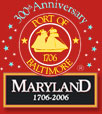Explore Port Careers
All about...Customs
and Border Protection
What a customs and
border protection officer does . . .
U.S. Customs and Border Protection (CBP) is an agency of the Department of Homeland Security. Its primary role is to protect the nation’s borders. The agency was formed in 2003 to combine the work of three federal agencies: Immigration and Naturalization Service, the U.S. Border Patrol, and the Agriculture Department’s food inspection program.
Members of CBP monitor all cargo that enters the country, searching for weapons that could harm our citizens and agricultural products carrying pests or contaminated by chemicals. Since ports are one of the primary entries into this country, CBP pays particular attention to them, enforcing import and export laws and regulations of the U.S. federal government and conducting immigration policy and programs.
Career Tidbits
- Most careers with CBP require a bachelor’s degree plus additional training for the specific job. In addition, those jobs that require physical stamina, such as Border Protection Officers, require that candidates pass a fitness test.
- On a typical day, CBP employees protect 7,000 miles of border and 95,000 miles of shoreline; manage 326 ports of entry; seize 5,500 pounds of narcotics; process over $84 million in duties, fees and tariffs; intercept known criminals and apprehend 3,000 people trying to enter the country illegally. They do all this while promoting lawful commerce and welcoming 1.1 million visitors.
A person working in customs and border protection typically has:
These skills and abilities:
Self-motivation, integrity, physical strength and abilities, communication and customer relations skills, computer skills, math and engineering skills
This knowledge:
- How customs operations function at various transportation hubs
- Basic legal issues surrounding the transfer of goods and people throughout the world
- Policies, procedures and strategies to use in security operations protecting people and property
- An understanding of human behavior and performance, especially under pressure
This training:
Once candidates have cleared a background check, they go to a federal law enforcement training center and are assigned to a specific port or airport. Background in the following is also helpful to people who choose this career: law enforcement, military, positions working at ports or airports handling cargo, experience dealing with people from many different cultures.
This education:
A high school diploma is required for these positions. To advance in this career, a lot of on-the-job training in federal law-enforcement is also required.
Customs and Border Protection provides a vital port service…
Find out about other careers at the Port.





